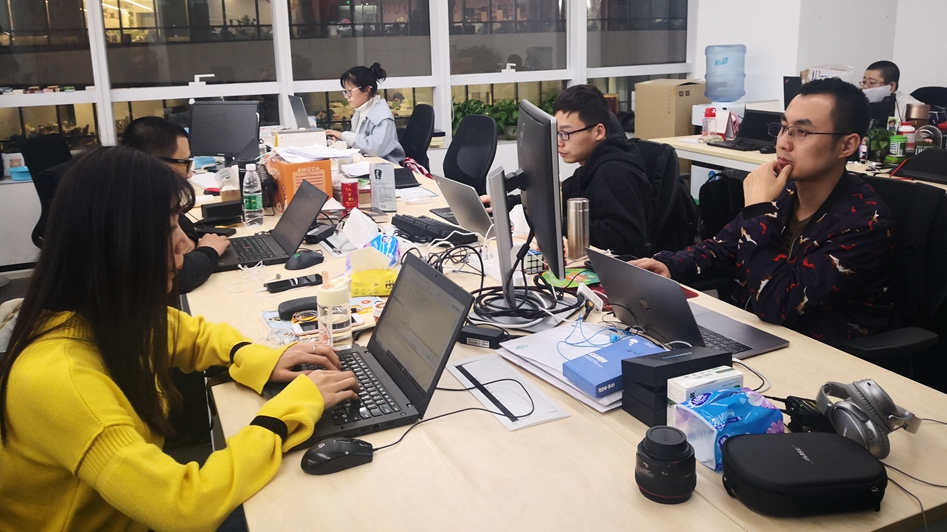Yes, China offers competitive software engineering programs, strong industry ties, and ample research opportunities, making it an excellent choice for study.
Table of Contents

The Landscape of Software Engineering in China
Major Cities for Software Engineering: Beijing, Shanghai, Shenzhen, etc.
- Beijing:
- Home to top universities like Tsinghua University and Peking University.
- Origin of tech giants like Baidu and Lenovo.
- Offers numerous job opportunities and networking platforms for software engineers.
- Shanghai:
- Financial hub with a robust software industry.
- Houses well-regarded universities like Shanghai Jiao Tong University and Fudan University.
- Modern tech parks catering to both local and international markets.
- Shenzhen:
- Known as China’s Silicon Valley.
- Hub for tech startups and innovation.
- Hosts major companies like Huawei and Tencent.
- Vibrant and youthful city with ample opportunities for budding software engineers.
Software Parks and Innovation Hubs
- Zhongguancun Software Park in Beijing:
- Often referred to as “China’s Silicon Valley.”
- Hosts over 20,000 tech companies, including industry leaders.
- A significant focal point for software engineering in China.
- Zhangjiang High-Tech Park in Shanghai:
- Major center for R&D in software and biotechnology.
- Operations from major companies like Alibaba and Ctrip.
- Aims to foster innovation in software engineering.
- Shenzhen Software Park:
- Cornerstone for software and IT services.
- Provides office space and incubation services for startups.
- Contributes to a thriving ecosystem of innovation and development.
Educational Institutions
Top universities for software engineering in China
| No. | University Name | Location | Notable Features |
|---|---|---|---|
| 1 | Tsinghua University | Beijing | Offers numerous scholarships and has top-ranked software engineering programs. |
| 2 | Peking University | Beijing | Known for its research capabilities and has multiple funding options for students. |
| 3 | Shanghai Jiao Tong University | Shanghai | Boasts strong industry connections and internship opportunities. |
| 4 | Fudan University | Shanghai | Offers specialized tracks in software engineering and related fields. |
| 5 | Zhejiang University | Hangzhou | Renowned for its research labs and international collaborations. |
| 6 | Beijing Institute of Technology | Beijing | Strong focus on practical skills and project-based learning. |
| 7 | Harbin Institute of Technology | Harbin | Known for its focus on AI and machine learning in its software engineering programs. |
| 8 | University of Science and Technology of China | Hefei | Offers a well-rounded software engineering program and numerous research opportunities. |
| 9 | Tongji University | Shanghai | Provides a variety of software engineering courses, along with scholarships for top-performing students. |
| 10 | Xi’an Jiaotong University | Xi’an | Known for its software engineering programs that have strong emphasis on emerging technologies. |
Comparison with Western Institutions
- Quality of Education:
- Chinese universities like Tsinghua University and Peking University rival the quality of Western institutions such as MIT and Stanford.
- Research Focus:
- Both Western and Chinese institutions prioritize research, but China is rapidly increasing its research funding in software engineering, especially in fields like artificial intelligence and blockchain technology.
- Faculty:
- While Western institutions often boast a more diverse faculty, Chinese institutions are increasingly recruiting top talent from around the globe to teach software engineering.
- Campus Facilities:
- Western institutions may offer a more holistic campus life, but Chinese universities are heavily investing in state-of-the-art laboratories and research centers.
- Cost of Education:
- Studying in China can be significantly cheaper, even for high-quality software engineering programs, than in Western countries.
Curriculum and Specializations
- Core Curriculum:
- Chinese universities offer a robust foundational curriculum in programming languages, data structures, algorithms, and computer organization similar to top Western universities.
- Specializations:
- Chinese educational institutions are starting to offer highly specialized courses in emerging areas like cyber-security, cloud computing, and data analytics.
- Project-Based Learning:
- There is an increasing emphasis on hands-on projects and internships, closely aligning the educational experience with real-world industry requirements.
- Capstone Projects and Theses:
- Similar to Western educational systems, advanced students often have the opportunity to work on capstone projects or write a thesis under the guidance of experienced professors.
Industry Connections
Tie-ups between Universities and Tech Companies
- Collaborative Research:
- Guest Lectures and Workshops:
- Industry experts often visit campuses to share insights and trends. Companies like Huawei frequently conduct workshops on technologies such as 5G and artificial intelligence.
- Lab Sponsorships:
- Companies often sponsor university labs or entire departments, providing financial support for research endeavors.
Internship Opportunities
- Local Opportunities:
- Tech hubs like Beijing and Shanghai offer a plethora of internship roles in software engineering. Whether it’s a startup or a well-established firm, students have a wide range of choices.
- International Exposure:
- Some universities have internship exchange programs, allowing students to gain experience abroad.
- Project-Based Internships:
- Many internships focus on completing a particular project or contributing to an ongoing initiative, offering practical experience that is highly valued by employers.
Job Placements and Career Prospects
- Campus Recruitment:
- Leading tech companies, both domestic and international, actively recruit from top Chinese universities.
- Alumni Network:
- Strong alumni connections help students find job opportunities and offer a platform for mentorship.
- Career Services:
- Universities often have dedicated career services offices that help with resume writing, interview preparation, and job search strategies.

Register to Free Apply Scholarship ,WhatsApp:
+86 15066822096
Research Opportunities
Research Centers and Labs
- State-of-the-Art Facilities:
- Many universities boast high-end research labs specializing in software engineering fields like machine learning, cybersecurity, and data science.
- Interdisciplinary Focus:
- Research centers often collaborate with other departments such as biology or physics, enabling groundbreaking interdisciplinary work.
Ongoing Projects and Collaborations
- Industry Partnerships:
- International Collaborations:
- Some research initiatives are in partnership with foreign universities or international organizations, offering students global research experience.
Funding and Grants
- Government Grants:
- Many research projects are backed by significant government funding, enabling long-term and large-scale initiatives.
- Private Funding:
- Startups and established companies alike invest in academic research, providing another avenue for grants and sponsorships.
- Scholarships for Research:
- Students who show promise in research often receive scholarships or stipends, making it financially easier to engage in intensive research work.
Cultural Aspects
The Learning Culture in China
- Competitive Environment:
- Chinese educational culture is often competitive, encouraging students to strive for excellence, particularly in STEM fields like software engineering.
- Collaborative Learning:
- Teamwork and group projects are increasingly common in Chinese universities, promoting a collaborative learning environment.
- Respect for Faculty:
- Teachers and professors hold a significant place of respect, somewhat more so than in many Western educational settings.
Networking and Community
- Alumni Relations:
- Chinese universities often have strong alumni networks that can be leveraged for mentorship and job opportunities.
- Industry Events:
- Regular networking events, hackathons, and seminars provide platforms for students to connect with industry professionals and like-minded peers.
- Student Organizations:
- Many campuses have software engineering clubs or technology associations that offer additional learning and networking opportunities.
Language and Communication Barriers
- Language of Instruction:
- While Mandarin is the primary language of instruction, a growing number of programs are being offered in English to attract international students.
- Cultural Nuances:
- Understanding local customs and social norms can significantly impact the ease of networking and collaboration in academic and professional settings.
- Communication Skills:
- With an increasing focus on global opportunities, courses in communication and cultural awareness are becoming more common in software engineering programs.

Government Policies and Support
Scholarships and Financial Aid for Software Engineering Students
- National Scholarships:
- The Chinese government offers various national-level scholarships to support students excelling in software engineering and related STEM fields.
- Provincial Funding:
- Certain provinces have their own scholarship programs to encourage local talent in the technology sector.
- University Grants:
- Individual universities often have merit-based or need-based financial aid, made easier through government backing.
Regulatory Environment for Technology and Education
- Curriculum Guidelines:
- Government policies shape the curriculum of software engineering programs, emphasizing both foundational and emerging technologies like Internet of Things and blockchain.
- Startup Ecosystem:
- Government regulations increasingly support the startup culture, allowing easier access to venture capital and other funding options for technology entrepreneurs.
- IP Laws:
- Intellectual property laws are being strengthened to protect technological innovations, which could impact software engineering research and entrepreneurship.
Future Plans and Initiatives
- Investment in R&D:
- The government plans to invest heavily in research and development activities, with software engineering being one of the priority areas.
- Talent Retention:
- There are future plans to offer more incentives to retain top software engineering talent within the country.
- International Collaborations:
- Government is showing interest in cross-border educational partnerships to elevate the standard of software engineering education and research.

International Students
Visa Process and Requirements
- Student Visa Types:
- International students typically require an X1 or X2 visa for long-term and short-term courses respectively.
- Documentation:
- Students need to provide admission confirmation, financial proof, and other necessary documents as part of the visa application.
- Timeline:
- The visa process usually takes a few weeks, so early application is advised to accommodate any delays or issues.
Campus Life for International Students
- Orientation Programs:
- Many universities offer orientation programs designed to familiarize international students with the campus and local culture.
- Accommodation:
- On-campus housing or nearby options are generally available, sometimes with dedicated dormitories for international students.
- Student Unions:
- Many universities have international student unions that assist new students and organize cultural events.
Language Courses and Support Services
- Mandarin Courses:
- Given the primary language in China is Mandarin, many universities offer Chinese language courses tailored for international students.
- Translation Services:
- Translation and interpretation services are often available for academic and administrative tasks.
- Counseling and Well-being:
- Emotional and psychological support services are usually available to help international students adapt to a new educational and cultural environment.

Additional Resources
List of Universities and Courses
- Comprehensive Lists:
- Various websites offer comprehensive lists of universities in China offering software engineering and related courses. Some even provide rankings based on faculty, infrastructure, and alumni success.
- Course Catalogs:
- Most universities have online catalogs that detail the software engineering courses they offer, making it easier for prospective students to decide on the right program for them.
Useful Websites and Links
- Government Websites:
- Official sites often provide up-to-date information on scholarships, visa processes, and other essential details for prospective students.
- Online Forums:
- Websites like Quora or Reddit often have sections dedicated to international students in China, offering personal experiences and tips.
- Job Portals:
- Websites specific to job openings in the tech industry in China can be useful for gauging the kinds of roles available and the skills they require.
Books and Articles for Further Reading
- Academic Journals:
- Publications like the “Journal of Software Engineering” provide in-depth articles and research findings relevant to this field.
- Biographies:
- Reading biographies of successful software engineers can provide both inspiration and valuable career insights.
- Guidebooks:
- Several guidebooks are available that are dedicated to helping international students adapt to life in China, covering everything from legal processes to cultural nuances.
What are the scholarship opportunities available?
Both national and provincial scholarships are available, offering up to 100% tuition waivers.
How competitive are software engineering programs in China?
Extremely competitive; top universities like Tsinghua and Peking University have acceptance rates as low as 5% for these programs.
What are the average tuition fees for software engineering programs?
Tuition can vary, but it generally ranges from $4,000 to $10,000 USD per academic year.
Is proficiency in Mandarin necessary?
No, many programs offer courses in English, but learning basic Mandarin can be beneficial.
What is the quality of research in Chinese universities?
Very high; universities often collaborate with tech giants like Alibaba and Tencent on cutting-edge research.
What is the average duration of a software engineering program?
Bachelor's programs usually last 4 years, while Master's programs can be completed in 1.5 to 2 years.
What is the cost of living for international students?
The cost of living can range from $300 to $1,000 USD per month, depending on the city.
Are there internship opportunities?
Yes, internships are plentiful and often come with a stipend ranging from $400 to $1,000 USD per month.

